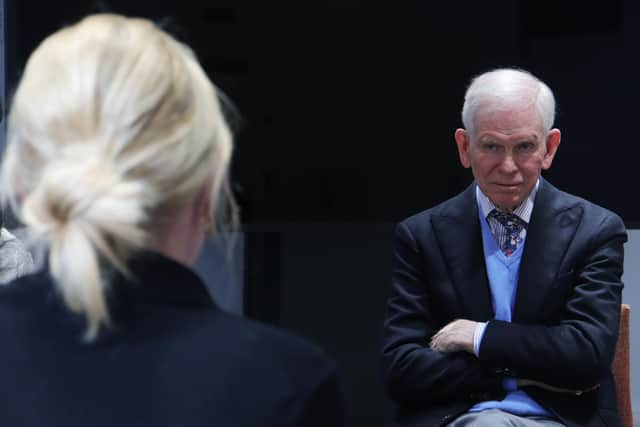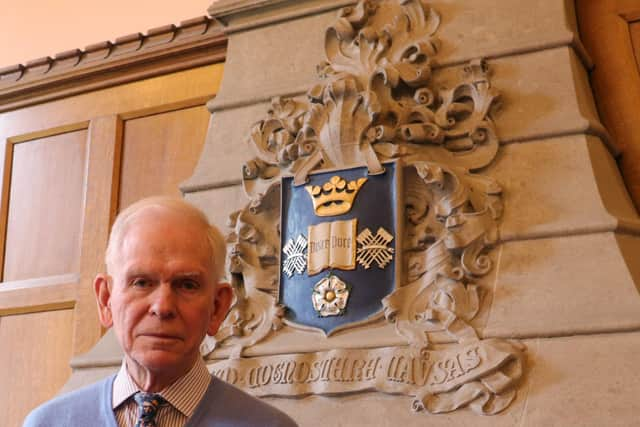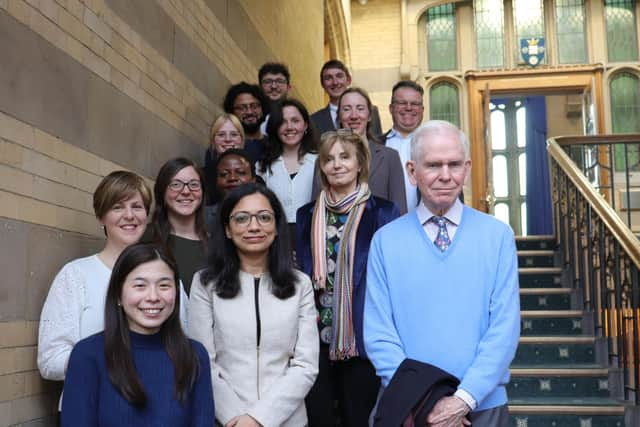Doncaster-born GMO founder Jeremy Grantham on funding University of Sheffield projects to tackle climate change
Living with his grandparents on Thorne Road - the family moved to their home in Yorkshire from Hertfordshire after his father, Bob, had volunteered for the Army - which was then decorated by “magnificent elm trees all the way around it and hundreds of rooks making incredible noise and building giant nests,” he remembers.
“One morning I woke up and they were cutting down all the iron fences, for the war, and then another day they wanted everyone to bring out their aluminium saucepans to build aeroplanes. And then they ploughed out the town fields, up the road and round the corner, and planted wheat,” he says. “So it was interesting times to be a kid. Everything was rationed. I remember being sent out with bread coupons, potato coupons, just after the war had ended.”
Advertisement
Hide AdAdvertisement
Hide AdHis grandfather, Joseph Cook, ran the popular Lyceum Restaurant on the High Street but, raised as a Quaker, the proprietor was not one for profiteering.


Mr Grantham, 84, has come a long way since then - he is co-chair and still leads the US-based investment firm GMO and has earned a reputation forecasting major economic events - but those early lessons in resourcefulness remain.
He spoke to The Yorkshire Post on a recent visit to his alma mater, the University of Sheffield, to see the work done in his name at Grantham Centre for Sustainable Futures, which trains the next generation of leaders and delivers world-class research in that area.
Mr Grantham and his wife Hannelore are the university's biggest donors, having committed £10.6 million in total, primarily supporting the centre itself, through the Grantham Foundation.
Advertisement
Hide AdAdvertisement
Hide AdOver the last few years the centre has come up with all kinds of research, briefings and ideas related to the environment. These include: suggesting sheep farmers could make money by allowing native trees to return to their land and selling ‘credits’ for the amount of carbon dioxide the trees absorb; briefing the Government on the health risk of pesticides amid concerns over pollution affecting vast swathes of agricultural land across the country; and how extensions on existing homes could help to tackle the housing crisis and meet net zero commitments.


The Foundation has also funded almost 100 Grantham Scholars - researchers from across various disciplines who work on topics related to the UN’s Sustainable Development Goals, and who benefit from a bespoke training programme which includes courses on communication, policy engagement and working with industry.
During his visit last month, Mr Grantham heard from PhD students who told him about their work looking into farm soils - “down to earth, straightforward stuff”, he says, which sets it apart from some other university research “that is of interest to 20 people”.
He says: “This is stuff that will be of consequence to millions or billions of people. How to make farms more productive, how to make them have a better carbon footprint, how to decrease the amount of energy they use, how to make them more profitable, as well.”
Advertisement
Hide AdAdvertisement
Hide AdMr Grantham studied economics as an undergraduate at Sheffield but went on to gain a MBA from Harvard Business School in 1966.


He went into finance, co-founding GMO in 1977, having previously been an economist for Royal Dutch Shell, and went on to predict the dot-com crash in 2000 and the financial crisis in 2008.
These days, addressing climate change has become his main concern.
"If we mean to save a reasonably stable global economy, we are going to have to decarbonize the global economy,” says Mr Grantham, who now lives in Boston, Massachusetts, where GMO is based.
Advertisement
Hide AdAdvertisement
Hide Ad“We're going to have to be able to produce energy and materials and products without producing carbon dioxide or methane or nitrous oxide, which are the three big greenhouse gases. And if we don't, temperature builds up, the weather deteriorates, storms, floods, droughts get worse, until we can't feed ourselves and societies, particularly in Africa, and I suspect India, might fail. So we have to move fast and it is absolutely existential. It's moving very fast. And more or less everyone feels that in their bones, don't they? The last two or three years, I mean, you can't pick up a newspaper without some amazing, uncomfortable event."
He adds: "We don't do this stuff well. This is not a problem designed for homosapiens. It's certainly not a problem designed for capitalism. Capitalism hasn't got a clue,” he says.
“And yet, if they don't pull their weight, we will fail. I think it is a little more than 50/50 that we will fail, in that a stable global society will not exist in 50 years, and you could say there are some good signs that we're moving in that direction pretty rapidly already. But we might pull it up. And as long as there's a decent chance you have to bust your tail. And that's what we're trying to do at Grantham Foundation.”
Mr Grantham is obviously aware of the irony here, having amassed so much wealth - though according to numerous reports has pledged to put 98 percent of his net worth, or about $1 billion, towards fighting climate change.
Advertisement
Hide AdAdvertisement
Hide Ad“I consider that I have been a capitalist. I consider that in my current form, I'm an anti-capitalist; I don't approve of the current form of capitalism,” he says.
“If I could be given nothing but the capitalist markets of Scandinavian countries, I would say I'm a pro capitalist - maybe throw in Holland, even Germany. But if you allow them to have all the political power, the famous economist (Joseph) Schumpeter in the 40s and 50s, he said the trouble with capitalism is that it's too damned effective. That unless you're careful, unless you regulate it, it will accumulate an enormous amount of power and they'll use that in politics to make sure that the rules of the game are changed in their favour. And pretty soon you'll have a world that is really good for giant corporations, and pretty mediocre for everybody else. And that's the world we fairly suddenly landed in the US. And the EU is not so bad. Scandinavia is not nearly as bad. The UK is pretty bad. It's not as bad as the US but it's got most of the weaknesses that apply. Corporations are too powerful, they have too much political influence.”
There is a “very important exception,” he believes.
“Venture capital is completely different to the rest of financial activity. It's doing something new. It's coming up with the new ideas and new technologies. It’s driving growth, it's driving productivity. People say ‘Oh, venture capital is very small’. And I say ‘I'll tell you how small it is, look at the facts’. Look at Apple and Microsoft and Facebook and Amazon and Google. They all came out of the venture capital industry and they came out recently. None of those guys are older than the firm that I started. Most of them are teenagers. And yet they dominate the world. They are magnificently successful. So don't tell me VC is small - venture capital is producing the lion's share of all the good new stuff, and I think it will be.
“I am absolutely impressed by the quality of the people in green VC. I am surprised that they are unlike capitalists in general, who can't spell the word altruism. These guys really care about what they're doing. They are involved with the green world. They value that they are working for a good cause. Either that or they're all Oscar-winning performers. And we know some of them very well, they really seem to care for what they're doing.”
Advertisement
Hide AdAdvertisement
Hide AdThe US has been a huge magnet for this activity with foreign start-ups but also, the country has a “death grip on the great research universities,” he says, citing the likes of the Stanford, Massachusetts Institute of Technology and Harvard.
“What is happening is they have great research laboratories, and they morph more or less seamlessly into an army of interesting start-ups.”
That’s where the Grantham Foundation comes in, offering grants at the development stage in universities, helping them to finish research and to become commercial entities - and Sheffield is just one beneficiary.
Not only is it the right thing to do, he believes, but it can be profitable too.
“Greening the global economy is a bottomless pit and gives rise to thousands of worthwhile projects.”